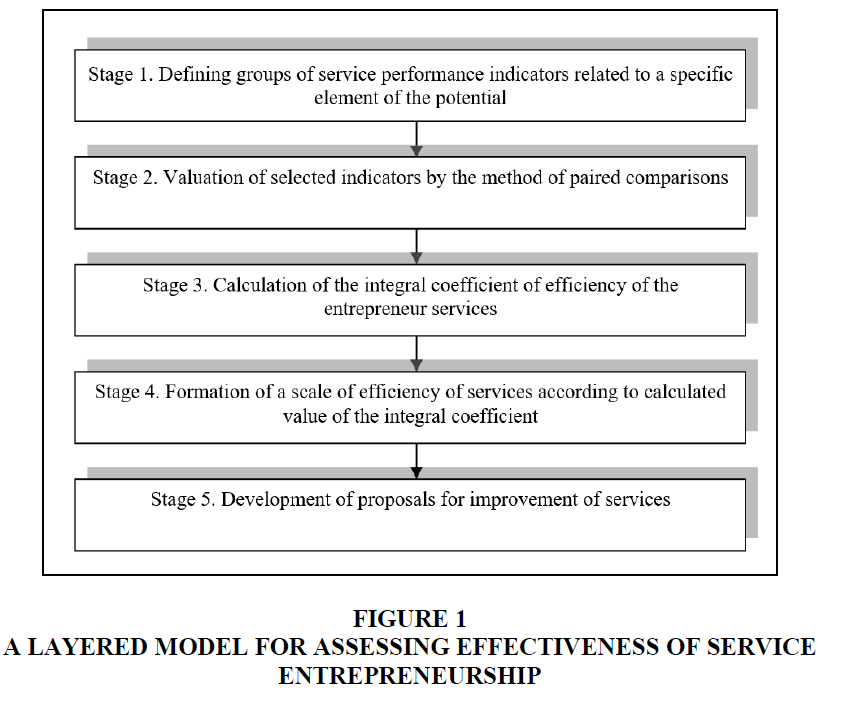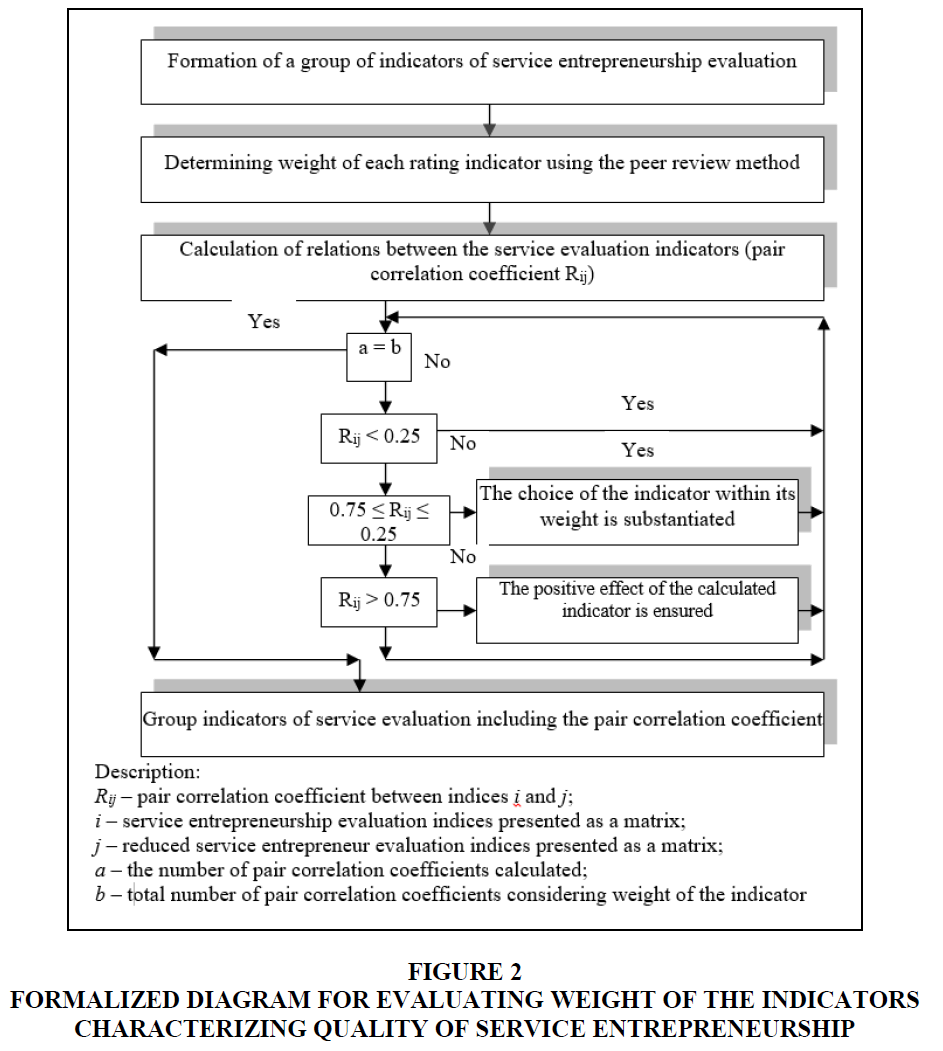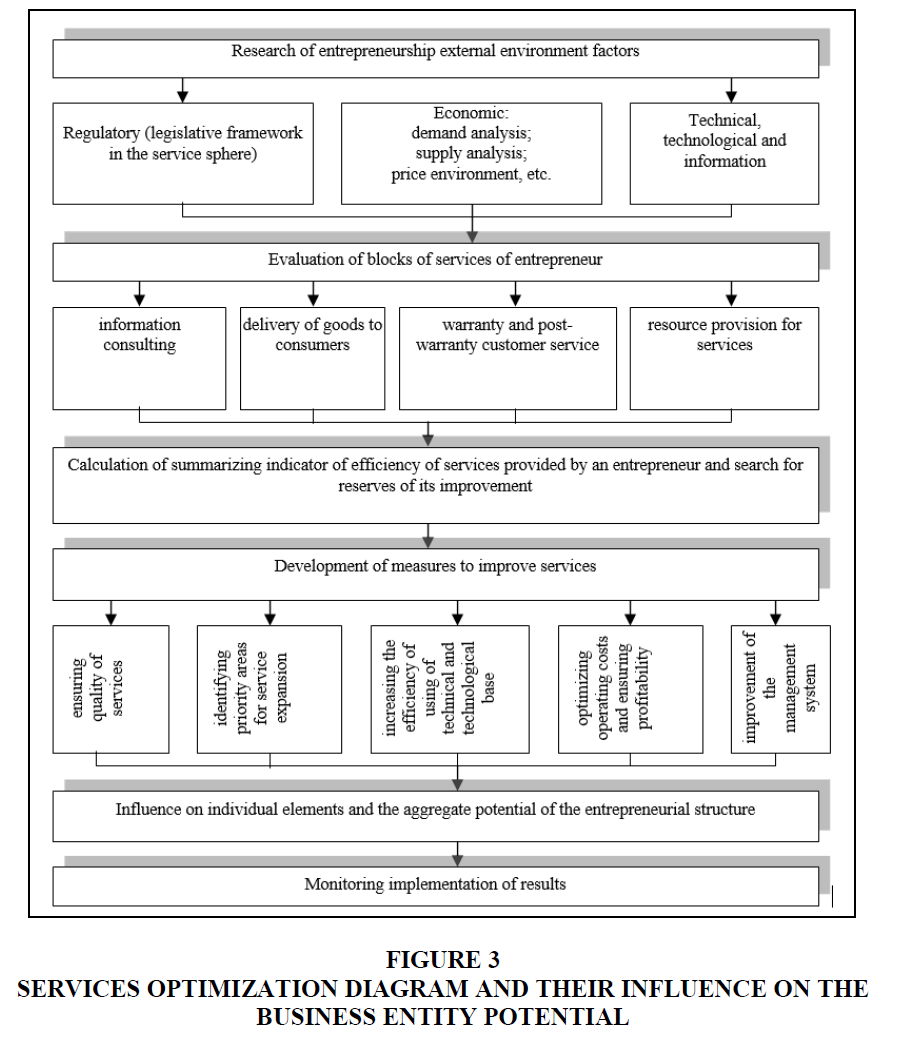Research Article: 2021 Vol: 25 Issue: 6
Increasing Efficiency of Entrepreneurial Potential in Service Sector
Olha Borysenko, University of Customs and Finance
Halyna Pavlova, Dnipro State University of Agriculture and Economics
Yuliia Chayka, Oles Honchar Dnipro National University, Ukraine
Natalia Nechyporuk, Open International University of Human Development “Ukraine“
Oleksandra Stoian, Petro Mohyla Black Sea National University
Abstract
The article deals with a functional issue of ensuring an effective utilization of entrepreneurial potential in the service sector. When considering theoretical and methodological bases of forming and ensuring the effective use of entrepreneurial potential in a competitive environment, the emphasis is placed on the essence of the entrepreneurial potential, which is characterized by the ability of a business entity to form all types of economic resources that it can possess or attract from outside and the ability to effectively use it to satisfy needs of consumers and obtain economic benefits, increasing their value in the long run. The main types of entrepreneurial potential include basic means of doing business, commodity resources, labor resources, financial resources. The specifics of potential formation and utilization are considered in the study of economic mechanism of entrepreneurship functioning in the service sector, which aims at maximum satisfaction of consumer needs, formation of a wide range of products, development of flexible pricing policy, quality assurance of services, introduction of modern information technologies, use of economic levers and incentives that encourage entrepreneurial structures to obtain maximum positive results from presence on the market. The efficiency assessment of utilization of entrepreneurial potential with the use of differentiated and generalized indicators has been made. Results of such an assessment made it possible to suggest ways to improve the existing methodological assessment tools and to calculate weight coefficients that adjust the expected real value of the aggregate potential. The proposed assessment methodology for entrepreneurial potential provides two options for estimating value of its elements: pessimistic and realistic.
Keywords
Service Entrepreneurship, Entrepreneurial Potential, Service Quality Assurance, Cost Forecasting.
JEL Classifications
B21, D11, L26.
Introduction
In recent years, business entities in the service sector have increasingly focused on service delivery as an important element of ensuring their own competitiveness and growing efficiency of doing business. Numerous studies and proposed measures to improve formation and provision of effective use of entrepreneurial potential in the service sector indicate that presently there is an urgent need to develop new methodological recommendations on utilization of the potential. It should be noted that the theoretical and practical aspects of extending provision of services in entrepreneurial activity and their impact on ensuring effective utilization of potential in the service sector in the economic literature remain poorly studied. Therefore, there is a need to consider theoretical and methodological approaches to provision of services in the process of conducting business activities, to develop methodological tools for assessing their quality level, to identify the main ways to optimize services, their impact on the aggregate potential and ensure additional economic benefits in practical activity.
Review of Previous Studies
The theoretical aspects of formation and effective utilization of the potential of business entities have been explored at different times by the following scientists (Ardichvilli et al., 2003; Casson & Della, 2007; Mitchell et al., 2002; Кwilinski, 2018). Further development of the theory of entrepreneurship on the basis of the resource approach in the modern scientific space has led to formation of the concept of "intellectual potential" or "dynamic abilities", which are ability of business entities to integrate, create internal and external competences in order to adapt to changing environment. Potential of service entrepreneurship was directly researched in the work (Dollinger, 2003; Thurik & Wennekers, 2004; Waters, 2016; Dalevska et al., 2019). A recognized priority for development of any business entity is the value it creates, which in the broadest sense is an integral characteristic of what individual consumers or their groups expect to receive from an entrepreneur.
Methodology
We propose to treat the potential of business entities as an integral concept that characterizes its ability to function on the market and reflects availability of appropriate capabilities to ensure its effectiveness. To conduct economic activities business entities that operate in the service sector need different types of resources (premises, special equipment, personnel, intangible resources, results of customer demand research, infrastructure, sales technologies, etc.) that are transformed into different types of potential, which have an appropriate place in its overall structure, and in economic activity certain ratios are formed and ensure economic efficiency. Formation and improvement of the potential structure should be carried out taking into account a multifunctional orientation, variety of this category.
Results and Discussion
The range of services provided by entrepreneurs in the service sector combines the following: information consulting, delivery of goods, warranty and post-warranty customer support, etc. In the service delivery process, service industry entrepreneurs develop appropriate mechanisms that ensure interaction of their structural units and promote competitive advantages (Murphy & Coombes, 2009). In our opinion, it is important to consider the degree of contact with consumers in the process of providing services by an entrepreneur. This is what reflects a physical presence of consumers in the service processes. The degree of contact can be defined as the ratio of the time that a consumer has to spend for the service delivery process to the total time that takes up the entire service process. Accordingly, the longer the duration of a business contact in the service sector with the consumer of the service, the higher the degree of interaction between them (Barringer et. al., 2005).
When designing services an entrepreneur should understand that it is impossible to create a stock of services. Therefore, in the service sector it is important to meet demand at the time it occurs. In this regard, the criterion of service bandwidth becomes paramount. Excessive volume of services leads to unnecessary costs, and its insufficiency - to loss of consumers, narrowing of the relevant market segment (Huang et al., 2010).
In our opinion, entrepreneurs in the service sector should use certain means and tools in order to achieve optimal service performance indicators. Choosing a target market and developing a range of services are responsibility of the owner. As a result, conditions for making informed service decisions are created, which increases efficiency of using the entrepreneur's potential (Kutzhanova et al., 2009; Rae, 2012; Drobyazko et al. 2019a; 2019b). We believe that at the present stage of utilizing potential of entrepreneurship in the service sector is provided in the following cases: a) recognition of the consumer as the pivot of the market economy; b) respectful and polite treatment of consumers; c) quick and convenient service delivery; d) introduction of a flexible pricing system; e) diversification of services; f) having unique skills that shape the level of service provision; g) developing effective mechanisms for maintaining quality of services, etc. Our research into the entrepreneurship in the service sector shows that the most important factor in ensuring competitiveness of entrepreneurship in the service sector is availability of services. In the article we consider specifics of services provided by entrepreneurs and determine their impact on the entrepreneurial potential itself (Table 1).
| Table 1 Specifics of Services, Their Characteristics and the Influence on Entrepreneurial Potential | ||
| Specifics of services | Characteristics | Influence on entrepreneurial potential in the service sector |
| Inability to store, stock up and transport | Unavailability of finished products | Provides an increase in case of guarantees and recommendations |
| Limited material component | Larger share of the labor costs in the overall structure of costs of service entrepreneurship than the cost of materials and components | Enables to increase value of the elements of entrepreneurial potential in service sector: technical, technological and operational personnel |
| Subjectivity of service quality assessment | Appears in providing services in repair of household goods | There is a need to make a specific assessment of the entrepreneurial potential in the service sector, taking into account satisfaction of the needs of consumers and identify the impact in terms of cost |
| Variability of service quality | Dependence of quality of service provided on qualification of personnel, level of remuneration | Provides increased potential by changing labor costs (depends on product complexity, its technical condition, number of orders, etc.) |
| Influence of the time factor | Consumer service time greatly influences satisfaction of his needs and, accordingly, demand for a certain type of services | There is a need to optimize the potential by assessing the value of technical and technological base for service delivery |
The data in Table 1 show that the influence of certain characteristics of services on the entrepreneurial potential is manifested in the change of its individual elements. In accordance with the considered theoretical approaches to provision of services in the process of functioning of entrepreneurship in the service sector, we have proposed a methodological toolkit for assessing the level of their effectiveness, which allows to increase the level of use of the potential of business entities. This toolkit is based on determination of the integral coefficient of efficiency of services rendered using elements of the entrepreneurial potential. The algorithm for determining the integral coefficient of entrepreneurship efficiency in the service sector is presented in Figure 1.
The diagram proposed below in Figure 2 allows to determine the weight of a group of indicators that characterize the entrepreneurial services, by the method of expert estimation and to apply economic and mathematical modeling (coefficient of pair correlation) (Altinay & Okumus, 2010).
Calculation of the integral coefficient of efficiency of entrepreneurship in the service sector, taking into account the degree of weight of each indicator that affects its quality, is presented in Figure 2. As shown in Figure 2, calculation of the integral coefficient of efficiency of service entrepreneurship in the service sector uses calculated indicators, reduced according to regulatory or industry-wide. Formed matrixes of groups of indicators characterizing services allow to calculate the optimum value for each of them.
Figure 2 Formalized Diagram for Evaluating Weight of the Indicators Characterizing Quality of Service Entrepreneurship
It is proposed to determine quality level of service entrepreneurship by calculated value of the integral indicator (Table 2).
| Table 2 Scale of Service Entrepreneurship Level Evaluation | |
| The integral coefficient of service efficiency value Ij | Entrepreneur service quality level |
| ІJ є (0 ; 0.25] | low |
| ІJ є (0.25 ; 0.5] | satisfactory |
| ІJ є (0.5 ; 0.75] | acceptable |
| ІJ є (0.75 ; 1] | high |
The proposed methodological toolkit for evaluating effectiveness of services allows in the following stages to work out the main ways of increasing its level, which will serve as a basis for formation and ensuring productive use of the entrepreneurial potential. Business owner is responsible for developing a quality service policy, its compliance with the customer requirements and its efficiency (Desrochers & Sautet, 2008). Implementation of such a policy depends on how sound it is in entrepreneurship. Given the necessity to ensure a high level of quality of services provided, there is a need to address the following objectives: a) identification of the needs of consumers and development of necessary measures to ensure quality of services; b) development of preventive and control measures to avoid customer dissatisfaction; c) optimization of costs for ensuring a high level of service quality; d) ongoing analysis of customer service requirements and quality level achieved in order to identify appropriate reserves. The diagram of optimization of services provided and its impact on the entrepreneurial potential are presented in Figure 3.
According to the diagram shown in Figure 3, in order to optimize provided services, we have identified a direction such as improving their quality, as this significantly affects certain elements of the potential.
In order to fulfil the quality assurance tasks, an entrepreneur should create a quality system, which allows at all stages of service provision to effectively manage, evaluate and improve its quality. At the same time, it is necessary to establish a personal responsibility and authorities of the operating personnel, on whose activity depends the level of quality of services.
Recommendations
The service entrepreneurship model should justify its own quality standards for the services provided and monitor their compliance. We emphasize that ensuring a high level of service quality requires involvement, dedication and effective interaction of all personnel. It is necessary to provide for a constant and independent monitoring of quality of the customer service system in order to determine to what extent it complies with the established standards and allows to implement an effective quality policy. Monitoring should be carried out by independent bodies, which inform the entrepreneur of its results and provide appropriate recommendations for eliminating identified problems and deficiencies. In the world practice, the widespread form of monitoring quality of service provided by entrepreneurs in the service sector is the use by independent structures of the so-called "secret consumer" of services.
Conclusions
Directions for increasing efficiency of utilizing the entrepreneurial potential in the service sector were developed, and they are based on ensuring quality of services, namely: entrepreneurial consulting, delivery of goods, warranty and post-warranty services, etc. Optimization of services implies introduction of a quality policy, which will enable entrepreneurs to establish effective communication with consumers, and will increase efficiency of use of operating personnel. To determine quality of services, a methodological toolkit for evaluating their effectiveness was proposed, and an integral coefficient of service efficiency was calculated, the essence of which was to evaluate groups of indicators that characterize individual elements of entrepreneurial potential, their weights were determined, and calculation of reduced efficiency indicators through pair correlation. Based on the results of the calculations, the influence of service efficiency indicators on the business entity potential is determined.
References
- Altinay, L., & Okumus, F. (2010). Franchise partner selection decision making. Service Industries Journal, 30(6), 929-946.
- Ardichvilli, A., Cardozo, R., & Ray, S. (2003). A theory of entrepreneurial opportunity identification and development. Journal of Business Venturing, 18, 105-124.
- Barringer, B.F., Jones, F.F., & Neubaum, D.O. (2005). A quantitative content analysis of the characteristics of rapid-growth firms and their founders. Journal of Business Venturing, 20, 663-687.
- Casson, M., & Della, G.M. (2007). Entrepreneurship and social capital-Analysing the impact of social networks on entrepreneurial activity from a rational action perspective. International Small Business Journal, 25(3), 220-244.
- Dalevska, N., Khobta, V., Kwilinski, A., & Kravchenko, S. (2019). A model for estimating social and economic indicators of sustainable development. Entrepreneurship and Sustainability Issues, 6(4), 1839-1860.
- Desrochers, P., & Sautet, F. (2008). Entrepreneurial policy: The case of regional specialization vs. spontaneous industrial diversity. Entrepreneurship Theory and Practice, 32(5), 813-832.
- Dollinger, M.J. (2003). Entrepreneurship: Strategies and resources. 3rd edition, Upper Saddle River, NJ: Prentice Hall.
- Drobyazko, S., Barwińska-Małajowicz, A., Ślusarczyk, B., Zavidna, L., & Danylovych-Kropyvnytska, M. (2019a). Innovative entrepreneurship models in the management system of enterprise competitiveness. Journal of Entrepreneurship Education, 22(4).
- Drobyazko, S., Okulich-Kazarin, V., Rogovyi, A., Goltvenko, O., & Marova S. (2019b). Factors of influence on the sustainable development in the strategy management of corporations. Academy of Strategic Management Journal. 18(S1).
- Huang, J.Y., Chou, T.C., & Lee, G.G. (2010). Imitative innovation strategies: understanding resource management of competent followers. Management Decision, 48(6), 952-975.
- Kutzhanova, N., Lyons, T.S., & Lichtenstein, G.A. (2009). Skill-based development of entrepreneurs and the role of personal and peer group coaching in enterprise development. Economic Development Quarterly, 20(10).
- Кwilinski, A. (2018). Mechanism of modernization of industrial sphere of industrial enterprise in accordance with requirements of the information economy. Marketing and Management of Innovations, 4, 116-128.
- Mitchell, R.K., Smith, J.B., Morse, E.A., Seawright, K.W., Peredo, A.M., & McKenzie, B. (2002). Are entrepreneurial cognitions universal? Assessing entrepreneurial cognitions across cultures. Entrepreneurship Theory & Practice, 26(4), 9-32.
- Murphy, P.J., & Coombes, S.C. (2009). A model of social entrepreneurship discovery. Journal of Business Ethics, 87(3), 325-336.
- Rae, D. (2012). Enterprise & entrepreneurship education: The new curriculum guidelines in Ireland and the UK. ISBE Conference, Dublin.
- Thurik, R., & Wennekers, S. (2004). Entrepreneurship, small business and economic growth. Journal of Small Business and Enterprise Development, 11(1), 140-149.
- Waters, S. (2016). Top Four Reasons People Don’t Start a Business. About Money. Retrieved from http://retail.about.com/od/startingaretailbusiness/tp/overcome_fears.html


